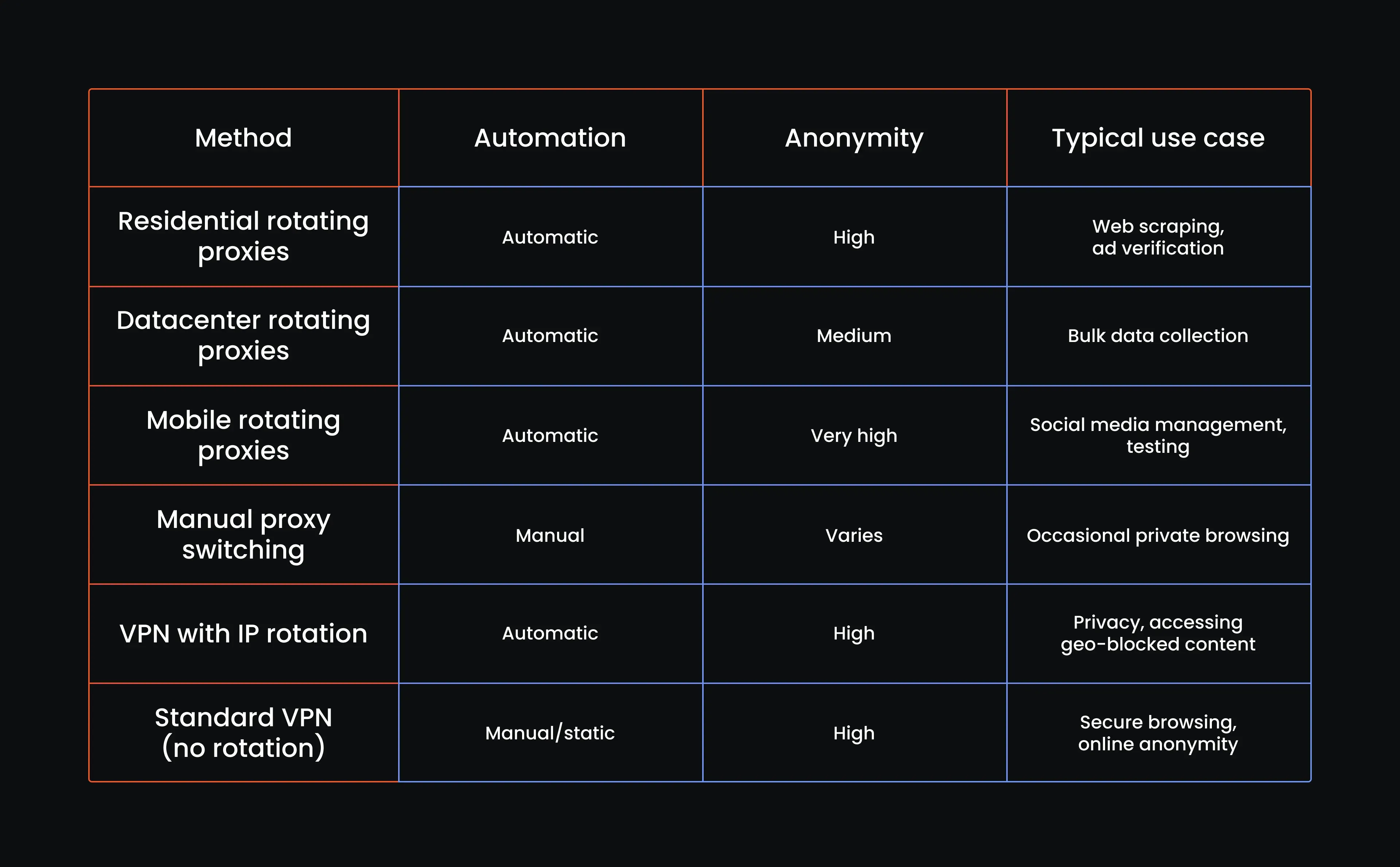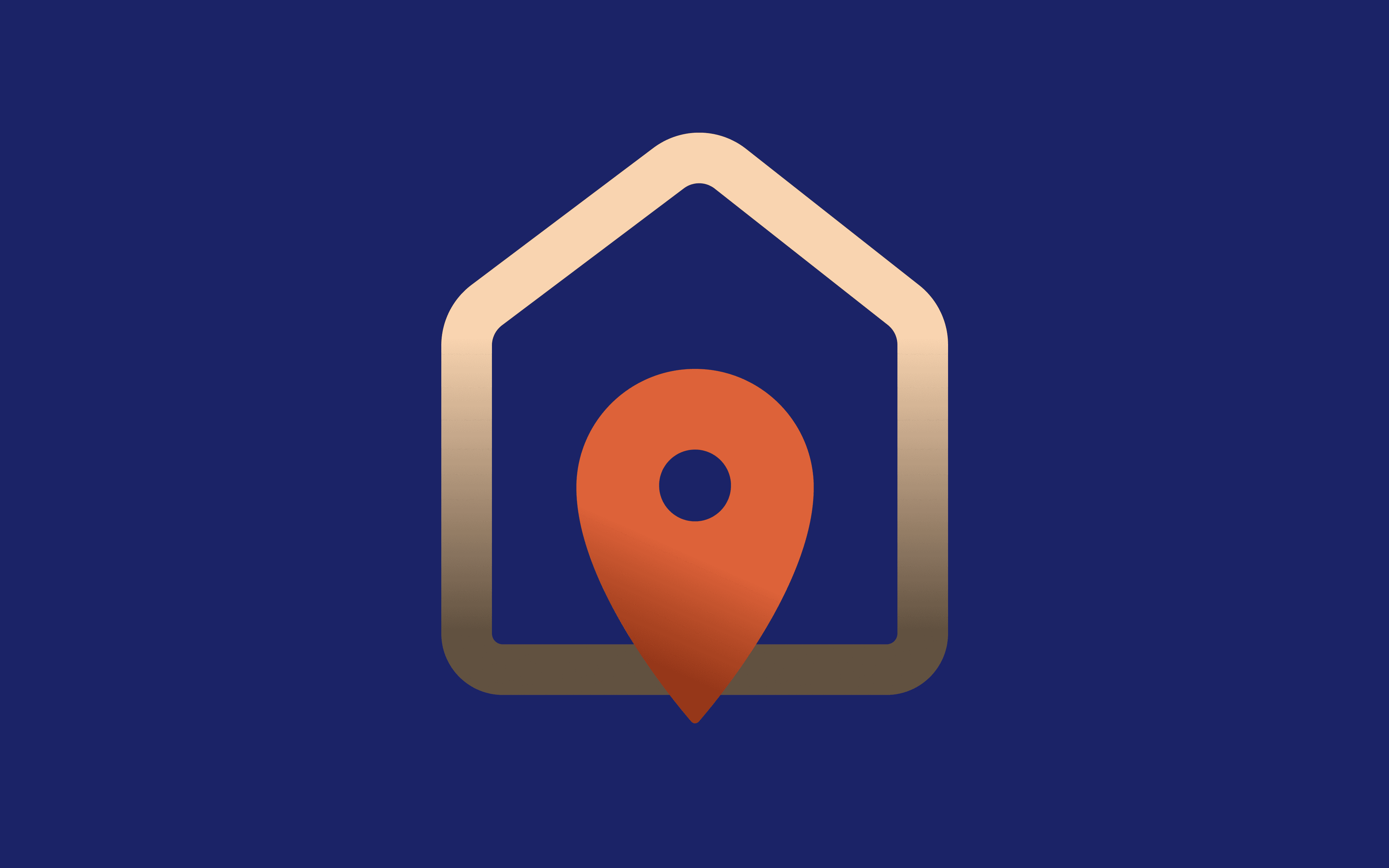The internet connects billions of devices, each with a unique identifier to locate it within this vast network. This identifier is called an Internet Protocol address, or IP address, in short. Whenever you connect a new device to the internet, it is automatically assigned an IP address for identification.
Typically, you get your public IP from your internet service provider. It assigns a public IP to your router so that all connected devices and your online activities have a single identifier. This way, whenever you browse the website or want to download something, it knows its delivery path.
But, the same IP address can also be used for online surveillance, geographical restrictions, and IP bans. That's where IP address rotation jumps in. In this article, we will explain what IP rotation is, its use cases, and different rotation methods.
What is IP rotation?
IP rotation is a process of regularly changing your public IP address to a different one. This way, websites cannot link various online activities, like web scraping, to a single user. Instead of communicating online with your original IP, you can use multiple IP addresses to avoid detection and bans.
Typically, a proxy server handles IP rotation. For example, our residential proxies offer fully customizable IP rotation and can assign a new IP address for each HTTP request. Simultaneously, we offer sticky sessions that issue an IP address and rotate it at chosen time intervals from one second to seven days.
There are more ways to get different IP addresses besides proxy servers. Sometimes, you may need manual IP rotation - specifying an alternative IP instead of using random IP rotation. Also, some online operations, like banking, streaming, or playing online games, may require a static IP throughout the entire session.
Static and dynamic IPs
A static IP address means that your router's online identifier does not change. Internet service providers often rotate unused IPs due to IP pool limits. The most widely used IPv4 addresses are 32-bit number expressions, so there's a finite amount.
Because the number of internet-connected devices skyrocketed over the last decade, the 4.3 billion IPv4 address pool is quickly running out. The newer IPv6 IP address version is gradually taking over IPv4, which offers a nearly unlimited 340 undecillion IP address pool.
A static IP address is beneficial in several cases. You may need one if you want to set a remote connection to your devices, such as connecting to nanny cams from your smartphone. It is also crucial for safe remote work, as many businesses use a virtual private network (VPN) to establish a secure and encrypted connection, which only allows specific IP addresses to reach business networks.
Obtaining a static IP generally requires an additional payment. For example, AT&T charges $15 per month for five static IPs, while a VPN static IP can cost between $2 and $9 per month.
On the other hand, most internet users get dynamic IPs to redistribute unused ones efficiently. Most ISPs will assign your public IP address to another user once you shut down or restart the router, but it should not be likened to an IP rotation service.
On many occasions, like web scraping and private browsing, you will need a specific IP rotation method. That's why we offer proxy servers in 190 countries with state and city-level targeting. This way, you can specify an exact proxy server location to access local content, research keywords, and place ads.
How IP rotation works
IP rotation uses a different device to obtain an alternative user's IP address. Residential proxies utilize a genuine residential connection and devices, such as laptops or tablets, while datacenter proxies come from specialized cloud servers designed to redirect online traffic. You may also use a VPN to manually switch IPs or enable automatic IP rotation, but that is a less common feature.
Whenever you connect to a proxy server, your online traffic is rerouted through it. The website you browse or scrape only sees the information from that device, while yours remains hidden. This way, you can use a proxy server in a different location to bypass geo-blocks or use rotating proxies to increase web scraping success rates.
What is proxy rotation?
Rotating proxy servers is the most widely used method to obtain new IPs. Firstly, unlike VPNs, you don't have to install any IP rotation software. Residential proxies often have built-in IP rotation, or you can manually set an alternative IP address using system proxy settings.
Proxy rotation simply means changing the IP address regularly. It ensures that your HTTP requests appear to be coming from different devices. Advanced users can implement scraper IP rotation to send multiple requests simultaneously, which increases its speed and success rates.
Why rotate proxies
IP rotation ensures that your online activities benefit from an additional layer of online privacy. Rotating proxies are widely used for web scraping, SEO, and social media marketing. Simultaneously, a new IP address in a different country helps bypass restrictions imposed by content licensing agreements and copyright laws.
Let's overview IP rotation use cases in more detail.
Avoiding IP bans and rate limiting
Websites implement strong cybersecurity measures to protect against malicious actors. Businesses like Cloudflare offer DDoS attack protection that prevents the unlawful use of bot networks to send fake traffic and overload servers, preventing them from being taken down. Unfortunately, it also interferes with legitimate data-gathering operations.
On many occasions, you will run into IP bans if you try to scrape a website without a vast proxy pool. Because web scrapers work much faster than real people would manually, the cybersecurity system flags the IP address for bot-like activity. Then, it may issue CAPTCHAs, restrict access, or ban the IP address.
Rotating proxies ensures that each HTTP request uses a different IP address, bypassing IP restrictions and rate limiting. Web scraping professionals can also write Python scripts with a delay function to specify time intervals between each request to mimic human behavior. This combination greatly increases scraping success rates and minimizes the risks of detection and bans.
Accessing geo-restricted content
You may have noticed the "This content is not available in your region" error message when viewing YouTube videos. The internet is divided into regions with different online content access rules. Many Western websites are unavailable in China, and US residents enjoy US-exclusive Netflix or Disney+ content, which is not available worldwide.
Proxy rotation is a popular method to bypass geographical restrictions. Streaming services inspect the user's IP address to determine its country and display content only for that particular location. Bypassing these blocks is as simple as connecting to a proxy server in a different region.
For example, if you connect to a US proxy server from Europe, you can access US-only content, such as Hulu or ESPN+. The streaming services will notice a new IP address from the United States and grant access.
Web scraping
Proxy rotation is essential for fast and efficient web scraping. As we have previously discussed, anti-bot website cybersecurity protection can impact this process. Legitimate data collection for market research or SEO analysis is flagged as suspicious, interfering with business processes.
A web scraper with IP address rotation sends HTTP requests using different IP addresses to avoid detection. If you combine it with Python's delay function, burst IP rotation, and user-agent spoofing, your scraping operations will resemble a genuine person browsing. Furthermore, if one IP address is blocked, you can simply select a different one from the large proxy pool and continue.
Search engine optimization
SEO is an outstanding way to ensure your website ranks well on Google and other search engines. SEO specialists analyze what people search online using keywords and ensure that the website includes them to drive organic traffic.
Although tools like Ahrefs offer geographically localized keywords, rotating proxies provide additional value. By connecting to a proxy in a chosen country, SEO professionals can view search engine result pages (SERPs) as if they were there. It's a good way to analyze foreign markets and brainstorm localized content ideas.
Online privacy protection
It's a public secret that governments and Big Tech corporations gather large amounts of user data. It is especially worrisome in authoritarian countries that use online surveillance to persecute journalists and political activists. IP tracking is widely used to monitor a person's online activities.
Rotating proxies complicate IP tracking by issuing an alternative IP address to hide the original one. The popular private TOR browser uses proxy networks, known as nodes, to redirect user traffic between multiple proxies, making it extremely difficult to trace back to a specific person.
It is also crucial to understand the limits of proxy rotation. Unlike VPNs, proxies do not encrypt traffic by default, making them susceptible to other online surveillance methods, such as deep packet inspection and man-in-the-middle attacks. On the other hand, VPNs often lack a built-in IP rotation method, so the best option depends on the required anonymity level.
How to rotate IP addresses
There are several ways you can rotate IP addresses. The choice that suits you best depends on the required number of alternative IPs, your level of online privacy, and your technical skills. Let's overview the most popular IP rotation methods.
Rotating proxy services
Using a dedicated IP rotation service is best if you use it professionally, such as for market research, scraping scientific papers, or verifying ads. Noteworthy rotating proxy providers offer millions of alternative IPs to make IP rotation scalable.
You also benefit from different proxy types. Datacenter IP rotation is an affordable way to use proxies that offer one of the best connection speeds and uptime but are easily detectable. Meanwhile, residential and mobile proxies come from genuine user devices and minimize detection risks, but they also cost more.
If you need more control over IP address rotation, look for a provider that offers a proxy rotator. Typically, a proxy rotator is an add-on to manage datacenter IP rotation, which is unavailable by default. Keep in mind that residential and mobile proxies rotate automatically, so a separate proxy rotator is not necessary.
Automated and programmatic IP rotation
Many web scrapers and anti-detect browsers have built-in IP rotation features. You can add proxies and instruct the IP rotation software to use an alternative IP address for web scraping and social media management.
You can also create customizable IP rotation if you are versed in coding languages like Python and JavaScript. This method enables you to specify how to rotate IP addresses and set proxy downtime actions (for example, using Python's retry function) to prevent apps from hanging due to a failed connection.
Manual IP rotation via ISP
Remember that ISPs typically issue dynamic IP addresses, which can change at specified time intervals or upon router restart. Far from being a dedicated IP rotation service, restarting your router is an easy way to get a new IP address. Try this method if you are experiencing a temporary IP ban on online forums or game servers.
Using VPNs with IP rotation features
VPN is another go-to software for rotating IP addresses. Since it also applies additional online traffic encryption, it's a preferred choice for private browsing and evading governmental censorship. However, encryption also requires additional device resources, so it may slow down web scraping and application testing.
VPN IP rotation is also a rare feature, as this cybersecurity software is designed to establish a single secure connection to the internet. On most occasions, you will need to manually connect to different VPN servers to rotate IP addresses.

Implementing IP rotation for web scraping
IP rotation is widely used to gather online data. If you're scraping the web, here are some tips to make the process more efficient using proxies.
Challenges in web scraping without IP rotation
Due to online content restrictions, web scraping typically requires the use of rotating proxies to prevent IP bans and geographical content blackouts. Here are the most common challenges you may encounter while scraping without IP rotation.
- IP bans
Without IP rotation, websites will notice that your data-gathering requests come from the same IP address. It will trigger the website's anti-bot protection, resulting in restricted access to information or IP-based restrictions.
- Geographical restrictions
Some websites are only accessible to visitors from select countries, limiting access to information. You can bypass these blocks by getting an IP address in your targeted geographical location.
- CAPTCHAs
These annoying pop-ups are another method of website protection. If you use the same IP address for scraping for an extended period, it will result in a lower IP reputation score. In turn, you will see CAPTCHAs regularly to prove that you are a real person and not a bot.
- Rate limiting
Websites also define how many HTTP requests a single IP address can make. Since web scraping relies on hundreds of HTTP requests to grab complete data, random IP rotation ensures it does not trigger set limits.
Setting up rotating proxies in scraping tools
To take your data gathering to the next level, you can combine it with proxies to mimic human behavior. Here are a few helpful tools.
- Python Requests
Python Requests library is a widely used tool for streamlining HTTP requests. You can code IP address rotation, delay, retry, and Python timeout features and handle exceptions by highlighting connection errors.
- Python Scrapy
The Python Scrapy framework is another excellent option for scaling your web scraping. It enables you to code 'spiders' with specific data-gathering rules and parse the results to make the data ready for further analysis and use.
- Headless browsers
Scraping JavaScript websites with dynamic content is challenging. Use Puppeteer or Playwright headless browsers that can handle pagination, form filling, and button clicking to display personalized information.
All selected tools allow coding proxy IP rotation to maximize web scraping efficiency.
Best practices to avoid detection
To conclude, let's go over the best practices to avoid detection:
- Use IP rotation
IP tracking is still one of the most common online surveillance methods. IP rotation ensures you add an extra layer of online privacy for your online activities.
- Change user agents
Each HTTP request includes some information about the origin device. To ensure the websites do not trace your scraping requests back to you, make sure you switch user agents to mimic different devices each time.
- Choose the correct proxy type
You will get the best results if you use suitable proxies for different tasks. Residential proxies excel at evading geo-blocks and achieving undetectability, while mobile proxies typically have the best IP reputation scores for most sensitive data collection tasks.
Final thoughts
IP rotation is easy to understand, but its real-world applications are broad and often technologically challenging. Sometimes, switching to a different proxy or VPN server may be enough. At other times, you may need pre-configured IP rotation to handle more demanding tasks. If you’re having trouble selecting a suitable IP rotation method, visit our growing Discord community for additional tips and tricks.
What is an IP rotation?
IP address rotation is a process of regularly changing your public IP address to an alternative one. IP rotation can be automatic, but you can also set a new IP address manually in your device's system settings.
What is the difference between a static and rotating IP?
A static IP means your public IP does not change. Meanwhile, a rotating IP switches it at random or selected time intervals.
Should I turn on the rotating IP?
That depends. You should use rotating IPs to scrape the web and avoid online surveillance via IP tracking. On the other hand, a static IP is useful for accessing worldwide streaming libraries and managing multiple social media accounts.
How do I get a rotating IP?
The easiest way to get rotating IPs is by using a proxy service with a large network of servers. Alternatively, you can get a new IP by connecting to a VPN.
How much do rotating proxies cost?
The exact price depends on your chosen proxy service provider. At MarsProxies, we offer residential proxies with customizable rotation starting at just $3.49/GB.



